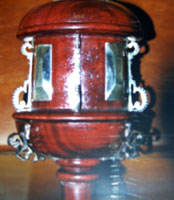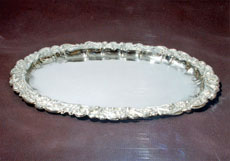| II. Theological Motives
The coexistence between Jews and Christians has always been problematic because, for many years, the axis of their relations had been religion. The Jewish and Christian religions are historical, with their beliefs being defined in the book, the Bible. The interpretation of the Old Testament, common to both religions, and, especially, that of the New Testament, exclusive to the Christian religion, gives rise to theological differences impossible to overcome by dialogue between both peoples. These differences create tensions which lead to conflicts, which in turn often end in violent clashes (reference).

This study will pay special attention, given their importance within Hispanic literature, to Fray Luis de Leon, Fray Luis de Granada, Antonio de Molina and Luis de la Puente (reference). In the search for information for this study, I visited many priests who kindly allowed me to use their libraries. Most of these libraries housed all or most of the books included in this study. In many seminaries in Spain, these books were obligatory spiritual reading, at least until the 1960s. From the II Vatican Council, both the priests and seminarists read and meditate on the works of theologians who inspired the Council. "The fact that the priests keep those texts in their libraries and that the libraries of the seminaries are full of them, does not mean that they still mark the ecclesiastical thought today. Many still read them as a source of information for the history of thought", as an expert in religious sociology mentioned to me.
The Jews kill Jesus
His main persecutors were "the powers of the infernal shadows, which are the demons", because "He expelled them from the bodies, and liberated the souls from their power, and destroyed their kingdom, which was the kingdom of sin"; and, in revenge, "incited the ferocity of men so that they would persecute him". He was aware of the fury of his enemies, "the demonic desire to torment him", and, still, his love remained, "because your heart is more full of love for your enemies to suffer their benefits, than their hearts are full of hate to look for your harm" (reference).
The Jewish People
The triumphant entry of Jesus in Jerusalem "increased the furious envy and hate towards him of the scribes, pharisees and pontiffs, who decreed together to bring death to he who gave life to so many " (reference)."Turning against him like rabid dogs, they let loose all their anger and fury towards him. There, all of them insisted on slapping him, knocking him, spitting with their infernal mouths on his divine face, covering his eyes with a cloth and, continuing to slap him, they then played with him, saying: Guess who hit you". "And the judge, finding himself amongst so many judges and tribunals, amidst so many abuses and injuries, amongst such a confusion of voices and cries accusing him and demanding his death, among such fury and anger of his enemies, and even with death drawing near and the cross present, and in the midst of so many waves and whirlwinds; the judge, seeing that he could not calm the fury of such cruel enemies, ordered so famous a punishment [to have him whipped]" (reference).
The Jews felt "mortal hate towards the Son of God alive, promised and given to them; they bore false testimony against him, perverted all truth and justice, persevered in their struggle to take away the life of the innocent Lamb, with many blasphemies pronounced against him and his divine works and sovereign mercies feeding their harmed wills on them, with a great desire to carry them out" (reference). Jesus was spat at, insulted and abused "by vile little men, abominable sinners, by people who believed righteously that they should spit, as if they were spitting on the vilest and most abandoned place in the world " (reference).
Of all those people, "nobody pitied him in this, nobody spoke up for him, nobody repressed the fury of those ferocious people, until they became tired of tormenting him". They shouted: "away with him" because their infinite fury prevented them from recognising Christ. "Must I crucify your king?", Pilate asked them. And they, yet again, blind with fury, shouted at once as one man: "let not our eyes see him any more, crucify him, so that this finishes once and for all". Their blindness was such that they did not think twice about covering themselves with the blood of the justest of all men, burdening themselves with the punishments they deserved. And this is what happened to them, as "the blood of Christ, which held the power to grant life to those who had spilled it, brought them their death, while they continued in their rebelliousness " (reference).

"The rabble shouts against him, asking for his death: one disciple betrays him, another denies him, and they all abandon him. To which must be added that this Lord had provided innumerable benefits to these people making him worthy of them loving him, honouring him and serving him". All these joined and turned against him, "tormenting and killing him who had done them such good, and who, not long before, they had judged worthy of the utmost honour, and who they acclaimed as the author of life". These enemies and persecutors, "proud, ambitious, greedy, hypocritical and false, were also enemies of the truth and the master who taught it". Possessed by passion, hate, resentment and envy of Christ, because He reprimanded their vices and obscured their vane honours with the authority of His knowledge, sanctity and miracles, and thus they wished to destroy him. "The soldiers, who were cruel by nature, had been told by the president to cruelly whip Him for these causes. And the devil pushed them to do so to move Christ Our Lord to impatience; and the princes of the priests and the Jews set fire to Him". Their great cruelty led them to mix bile with the good wine which was given to all those condemned to death, to torment his tongue, mouth and stomach, which had not been reached by the whips or the thorns (reference).
Those rough and ferocious executioners tied Jesus in such a way that he could not move or defend or cover any part of his body; this way, freely and at their pleasure, they could harm him all over his body. "Two of them started to give indiscriminate blows, using all their strength on that sacrosanct and beautiful body without missing a single part, and hurting it repeatedly". "The soldiers who had beaten Christ instigated by the Devil, invented new types of torments to use against Him, immensely painful and shameful; and to increase the force of the insults, they called upon the entire cohort of guard soldiers to attend this spectacle and to join in the mocking of Christ, at the expense of his honour and respite, and they attended gladly, eager for entertainment " (reference).
Priests, Judas and Pilate
"The damned Jewish priests" incite the masses to cry out against Jesus and in favour of Barrabas, a murderer and malefactor. The priests are "people of demonic cruelty", as in such a clear case they take sides with thief against the just man. And they did all this "with the greatest hypocrisy: showing zeal and love for the things of God and the temple"; showing pain at the blasphemies proffered by Jesus. Not happy with condemning him and waiting for the sentence to be carried out, "like beasts they slapped him, mocked him and spat on him". The princes and main figures of that "miserable people" were blinded with passion and outside themselves with hate and envy toward Jesus, completely "possessed by the spirit of Satan" which instigated and moved them; this is why they did not hesitate to say and do things in such an undignified way for them, so removed from justice and prudence (reference).
There are two versions of the popular legend about Judas. The Eastern legend, originating in Constantinople, dates back to the 4 th century and is mentioned by Matthew of Paris (13th century) who calls him Cartaphilus ; according to this version, Judas never has more than five copper coins to put together, but always manages to find them in his pocket, he is Pontius Pilate's doorkeeper and is condemned to immortality and perpetual movement. The Western legend gives him the name of Ahseverus and places him as a cobbler in Jerusalem. When the soldiers passed in front of his workshop taking Jesus to Calvary they asked him to allow them and Jesus to rest for a while in his entrance. Judas answered: "Walk, walk". Then, Jesus replied: "You will also walk. You will walk across every land until the end of centuries and when your fatigued body wishes to stop, that terrible word you have uttered will oblige you to start walking again". Since then, he has not stopped walking. People worthy of credit say they have seen him, some even say they have spoken with him, in Rome, London, Paris, Germany, Hungary, Denmark and Scotland. In 1575, two of Holstein's ambassadors saw him in Madrid and in 1599 he was said to be in Vienna. The old song of Brabant gives him the name of Isaac Laqueden . Pious authors, in their appreciations of Judas, fundamentally coincide with the legend in its different versions. Judas Iscariot, far from raising any suspicions about the sanctity of Christ, provides sound proof of it, as he cannot reveal anything to the contrary; he limits himself to revealing a plan to seize him. However, when he sees his master being condemned he declares himself guilty and testifies to the innocence of Jesus (reference).
Pilate, pusillanimous, bloated, proud and arrogant, on becoming aware of the innocence of Christ, did not have the sufficient presence of mind to free him, and had, however, the courage to ask the King of Kings for justification of the doctrine he had taught; he let himself be carried away by ambition, the desire to rule and the glory of power. Pilate had defended the innocence of Christ against the perfidy of the Jews, but when he was threatened with losing the friendship of the Caesar if he failed to condemn him, he condemned him immediately and with no ambiguity (reference).
|
